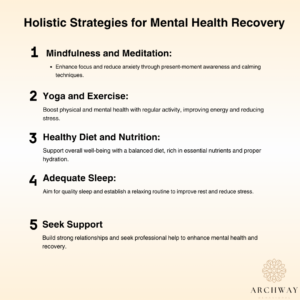A holistic approach to mental health recovery recognizes the interconnectedness of our physical, emotional, social, and spiritual well-being. By addressing all aspects of our lives, we can create a more comprehensive and sustainable path to healing.
This blog post will explore the key pillars of holistic mental health recovery, strategies to incorporate them into your life, and the benefits of this approach.
The Pillars of Holistic Mental Health Recovery
A holistic approach to mental health recovery focuses on addressing all aspects of your well-being. This includes:
Physical Health
- Regular exercise: Engaging in physical activity can boost mood, reduce stress, and improve overall well-being.
- Healthy diet: Eating a balanced and nutritious diet provides your body with the essential nutrients it needs to function optimally.
- Adequate sleep: Getting enough quality sleep is crucial for mental and physical health.
- Avoidance of substances: Substances like alcohol and drugs can exacerbate mental health problems.
Emotional Well-being
- Mindfulness and meditation: These practices can help you manage stress, reduce anxiety, and improve emotional regulation.
- Positive affirmations: Affirming positive statements about yourself can boost your self-esteem and confidence.
- Emotional expression: Finding healthy ways to express your emotions, such as journaling or talking to a trusted friend or family member.
Social Connection
- Building relationships: Strong social connections can provide support, companionship, and a sense of belonging.
- Joining support groups: Connecting with others who are going through similar experiences can be incredibly helpful.
- Volunteering: Giving back to your community can provide a sense of purpose and fulfillment.
Spiritual Growth
- Exploring spirituality: Exploring your spiritual beliefs or values can provide meaning and purpose in life.
- Engaging in spiritual practices: Participating in activities that connect you to something larger than yourself, such as meditation, prayer, or nature.
Environmental Factors
- Creating a positive environment: Surrounding yourself with positive influences and creating a calming environment can contribute to your mental well-being.
- Managing stress: Identifying and addressing stressors in your life can help reduce anxiety and improve overall mood.
Psychotherapy and Counseling
Engaging in therapy helps address the emotional, behavioral, and psychological aspects of mental health. A holistic approach often includes:
- Cognitive Behavioral Therapy (CBT): Focuses on changing negative thought patterns to improve emotional well-being.
- Dialectical Behavior Therapy (DBT): Combines mindfulness with behavioral therapy to treat mood disorders and emotional dysregulation.
- Holistic Psychotherapy: Integrates traditional talk therapy with complementary techniques, such as energy healing or creative therapies (e.g., art, music, or drama therapy).
Strategies for Holistic Mental Health Recovery
Mindfulness and Meditation
- Mindfulness: Paying attention to the present moment without judgment.
- Meditation: Various techniques to calm the mind and reduce stress.
- Benefits: Improved focus, reduced anxiety, and increased self-awareness.
Yoga and Exercise
- Physical benefits: Improved cardiovascular health, flexibility, and strength.
- Mental benefits: Reduced stress, anxiety, and depression.
- Increased energy: Regular physical activity can boost energy levels.
Healthy Diet and Nutrition
- Balanced diet: Consuming a variety of fruits, vegetables, whole grains, and lean proteins.
- Nutrient-rich foods: Prioritizing foods rich in vitamins, minerals, and antioxidants.
- Hydration: Staying hydrated is essential for overall health and well-being.
Adequate Sleep
- Quality sleep: Aim for 7-9 hours of quality sleep each night.
- Sleep hygiene: Establishing a consistent sleep routine and creating a relaxing sleep environment.
Stress Management Techniques
- Deep breathing exercises: Calming the mind and body through deep, slow breaths.
- Progressive muscle relaxation: Tensing and relaxing different muscle groups to reduce tension.
- Time management: Effective time management can help reduce stress and overwhelm.
Spending Time in Nature
- Connecting with nature: Spending time outdoors can have a positive impact on mental health.
- Mindfulness in nature: Practicing mindfulness while in nature can enhance the benefits.
Engaging in Hobbies and Interests
- Pursuing passions: Engaging in activities you enjoy can boost mood and self-esteem.
- Finding purpose: Hobbies and interests can provide a sense of purpose and fulfillment.
Building a Strong Support System
- Connecting with others: Building strong relationships with friends, family, and loved ones.
- Joining support groups: Connecting with others who understand your experiences.
- Seeking professional help: Talking to a therapist or counselor can provide valuable support and guidance.
The Benefits of a Holistic Approach
Adopting a holistic approach to mental health recovery can offer numerous benefits, including:
- Improved overall well-being: Addressing all aspects of your life can lead to a more balanced and fulfilling existence.
- Increased resilience: A holistic approach can help you develop the resilience to cope with challenges and setbacks.
- Enhanced self-awareness: Exploring different aspects of your life can deepen your understanding of yourself.
- Greater life satisfaction: A holistic approach can contribute to a greater sense of purpose, meaning, and fulfillment.
- Sustainable recovery: Addressing multiple factors can lead to a more sustainable and long-lasting recovery.
Conclusion
A holistic approach to mental health recovery is a powerful tool for improving your overall well-being. By addressing the interconnectedness of your physical, emotional, social, and spiritual health, you can create a more balanced and fulfilling life.
Remember, the journey to mental health recovery is unique for everyone. Be patient with yourself, celebrate your progress, and don’t hesitate to seek professional help when needed.
Archway Behavioral Health is dedicated to supporting individuals on their path to mental health recovery. Our team of experienced mental health professionals offers a range of services tailored to your individual needs. Call us at (888) 488-4103 or Contact us today to learn more or to schedule an appointment.
FAQs: Holistic Strategies for Lasting Mental Health Recovery
What is a holistic approach to mental health recovery?
A holistic approach considers all aspects of your well-being, including physical, emotional, social, and spiritual factors. It aims to address the root causes of mental health issues and promote overall wellness.
Why is a holistic approach important?
A holistic approach can lead to more sustainable and long-lasting recovery. By addressing multiple aspects of your life, you can create a more balanced and fulfilling existence.
How does physical health impact mental health?
Physical health and mental health are closely interconnected. Regular exercise, a healthy diet, and adequate sleep can significantly improve your mental well-being.
What are some effective exercise routines for mental health?
Activities like yoga, walking, swimming, or dancing can be beneficial for both physical and mental health. Find an activity that you enjoy and make it a regular part of your routine.
What should I eat for optimal mental health?
A balanced diet rich in fruits, vegetables, whole grains, and lean proteins can provide the nutrients your body needs to function optimally. Avoid excessive intake of processed foods, sugary drinks, and unhealthy fats.
How much sleep do I need for good mental health?
Most adults need 7-9 hours of quality sleep each night. Create a relaxing sleep environment and establish a consistent sleep schedule.



